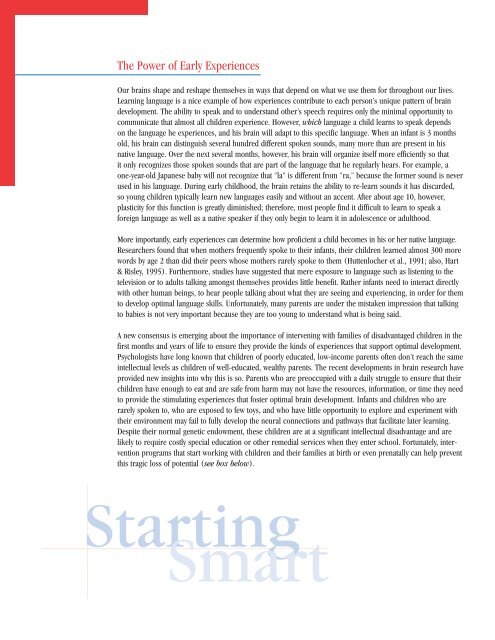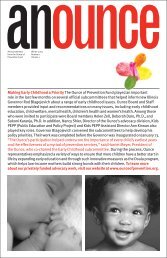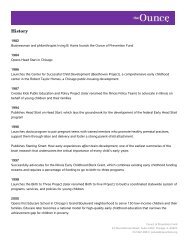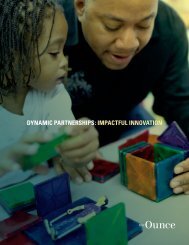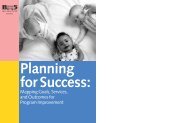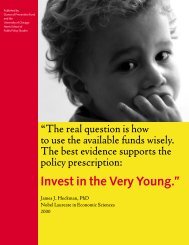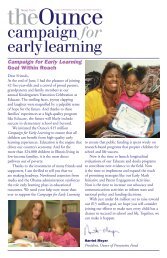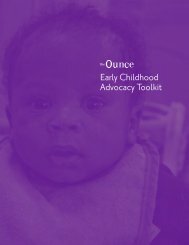How Early Experiences Affect Brain Development - Ounce of ...
How Early Experiences Affect Brain Development - Ounce of ...
How Early Experiences Affect Brain Development - Ounce of ...
Create successful ePaper yourself
Turn your PDF publications into a flip-book with our unique Google optimized e-Paper software.
The Power <strong>of</strong> <strong>Early</strong> <strong>Experiences</strong><br />
Our brains shape and reshape themselves in ways that depend on what we use them for throughout our lives.<br />
Learning language is a nice example <strong>of</strong> how experiences contribute to each person’s unique pattern <strong>of</strong> brain<br />
development. The ability to speak and to understand other’s speech requires only the minimal opportunity to<br />
communicate that almost all children experience. <strong>How</strong>ever, which language a child learns to speak depends<br />
on the language he experiences, and his brain will adapt to this specific language. When an infant is 3 months<br />
old, his brain can distinguish several hundred different spoken sounds, many more than are present in his<br />
native language. Over the next several months, however, his brain will organize itself more efficiently so that<br />
it only recognizes those spoken sounds that are part <strong>of</strong> the language that he regularly hears. For example, a<br />
one-year-old Japanese baby will not recognize that "la" is different from "ra," because the former sound is never<br />
used in his language. During early childhood, the brain retains the ability to re-learn sounds it has discarded,<br />
so young children typically learn new languages easily and without an accent. After about age 10, however,<br />
plasticity for this function is greatly diminished; therefore, most people find it difficult to learn to speak a<br />
foreign language as well as a native speaker if they only begin to learn it in adolescence or adulthood.<br />
More importantly, early experiences can determine how pr<strong>of</strong>icient a child becomes in his or her native language.<br />
Researchers found that when mothers frequently spoke to their infants, their children learned almost 300 more<br />
words by age 2 than did their peers whose mothers rarely spoke to them (Huttenlocher et al., 1991; also, Hart<br />
& Risley, 1995). Furthermore, studies have suggested that mere exposure to language such as listening to the<br />
television or to adults talking amongst themselves provides little benefit. Rather infants need to interact directly<br />
with other human beings, to hear people talking about what they are seeing and experiencing, in order for them<br />
to develop optimal language skills. Unfortunately, many parents are under the mistaken impression that talking<br />
to babies is not very important because they are too young to understand what is being said.<br />
A new consensus is emerging about the importance <strong>of</strong> intervening with families <strong>of</strong> disadvantaged children in the<br />
first months and years <strong>of</strong> life to ensure they provide the kinds <strong>of</strong> experiences that support optimal development.<br />
Psychologists have long known that children <strong>of</strong> poorly educated, low-income parents <strong>of</strong>ten don’t reach the same<br />
intellectual levels as children <strong>of</strong> well-educated, wealthy parents. The recent developments in brain research have<br />
provided new insights into why this is so. Parents who are preoccupied with a daily struggle to ensure that their<br />
children have enough to eat and are safe from harm may not have the resources, information, or time they need<br />
to provide the stimulating experiences that foster optimal brain development. Infants and children who are<br />
rarely spoken to, who are exposed to few toys, and who have little opportunity to explore and experiment with<br />
their environment may fail to fully develop the neural connections and pathways that facilitate later learning.<br />
Despite their normal genetic endowment, these children are at a significant intellectual disadvantage and are<br />
likely to require costly special education or other remedial services when they enter school. Fortunately, intervention<br />
programs that start working with children and their families at birth or even prenatally can help prevent<br />
this tragic loss <strong>of</strong> potential (see box below).<br />
Starting<br />
Smart


